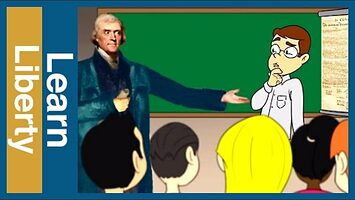Intellectual Property
Encyclopedia
Private property is the cornerstone of the market system. A well-functioning free-market economy requires that property rights be clearly defined and protected so that people can engage in trade. Most libertarians agree that such rights should be extended to physical property, but they differ about property rights in ideas (i.e., intellectual property). More specifically, they differ about whether patents and copyrights are legitimate.
Many market-oriented economists believe that intellectual property rights must be protected. In principle, they argue, people would have little or no incentive to invent and develop goods that they will ultimately bring to market. Consider prescription drugs, for instance. Such drugs have benefited millions of people, improving or extending their lives. Patent protection enables drug companies to recoup their development costs because for a specific period of time they have the sole right to manufacture and distribute the products they have invented. After that period elapses, these drugs may be sold in generic form. The copyright system works in a similar way and for similar reasons. Novelists, for example, have the exclusive right to profit from the stories they write as long as those works are under copyright. To libertarian supporters of patent and copyright, the key is to develop an optimal intellectual property regime, one that promotes both innovation and consumer welfare, not to abolish the system altogether.
But to other libertarians, abolition is indeed the proper goal. Intellectual property laws, they argue, cannot be ethically justified. Consider the position taken by libertarian philosopher Roderick Long. He writes:
Ethically, property rights of any kind have to be justified as extensions of the right of individuals to control their own lives. Thus any alleged property rights that conflict with this moral basis—like the “right” to own slaves—are invalidated. In my judgment, intellectual property rights also fail to pass this test. To enforce copyright laws and the like is to prevent people from making peaceful use of the information they possess. If you have acquired the information legitimately (say, by buying a book), then on what grounds can you be prevented from using it, reproducing it, trading it? Is this not a violation of the freedom of speech and press? It may be objected that the person who originated the information deserves ownership rights over it. But information is not a concrete thing an individual can control; it is a universal, existing in other people’s minds and other people’s property, and over these the originator has no legitimate sovereignty. You cannot own information without owning other people.
Some libertarian-minded critics of intellectual property laws maintain that, in many cases, such measures may simply be unnecessary. In the 1930s, the distinguished British economist Arnold Plant noted that many authors are not driven by the profit motive whatsoever. “For such writers copyright has few charms,” wrote Plant. “Like public speakers who hope for a good Press, they welcome the spread of their ideas.”
Still, Plant conceded that some “authors write books because copyright exists, and a greater variety of books is published.” It is important to keep the incentive to produce intact, while doing a better job of protecting the book-buying public, which often has to pay artificially high prices because the copyright terms have been extended too long.
More recently, Michele Boldrin and David Levine of Washington University in St. Louis made a comprehensive case against intellectual property, arguing that it
is not like ordinary property at all, but constitutes a government grant of a costly and dangerous private monopoly over ideas. We show through theory and example that intellectual monopoly is not necessary for innovation and as a practical matter is damaging to growth, prosperity, and liberty.
They give many examples of the development of new products and methods of production when intellectual property protection is either lax or nonexistent. One famous case is design—from fashion, to furniture, to architecture. In the United States and many other countries, a firm can ostensibly patent the design of, say, a dress, but other firms can quickly sell similar items at sharply lower costs. Meanwhile, the pace of innovation in the clothing industry remains robust. “The now worldwide phenomenon of the Spanish clothing company Zara (and of its many imitators) shows that one can bring to the mass market the designs introduced for the very top clientele with a delay that varies between three and six months,” write Boldrin and Levine. “Still, the original innovators keep innovating, and keep becoming richer.”
Indeed, most libertarians, whether they support or oppose intellectual property laws in theory, believe that, in practice, such laws have been manipulated beyond their intended purpose. Consider the Copyright Term Extension Act (CTEA), passed by Congress in 1998, which added 20 years to all copyright terms. The result is that copyrights are now protected for the lifetime of a work’s creator plus 70 years following his death, and that copyrights held by corporations are good for 95 years. The CTEA, libertarians have argued, gave an unfair monopoly grant to a few copyright holders at the expense of millions of potential consumers. In other words, Walt Disney Co. benefits substantially from the CTEA because without it some of Disney’s most famous images, such as Mickey Mouse, would have entered the public domain. However, people who would like to read, say, an out-of-print, but still copyrighted, poem by Robert Frost would be damaged because no one would be allowed to publish it online without charge.
The constitutionality of the CTEA was challenged in the courts. A group of economists, including many prominent classical liberals such as James Buchanan, Ronald Coase, and Milton Friedman, submitted a “friend of the court” brief urging the law be overturned. They maintained that extending copyright for existing works “makes no significant contributions to the author’s incentive to create, since in this case the additional compensation was granted after the relevant investment had already been made.” In other words, it is simply a windfall to the owners of the relatively small percentage of copyrighted works that remain commercially viable. The Supreme Court was not persuaded, however, and upheld the CTEA on a seven-to-two vote.
Ultimately, nearly all libertarians believe that the current system of intellectual property laws is too rigid and should be liberalized. How far we should go toward dismantling the system, and for what reasons, are the real points of contention.
Further Readings
Boldrin, Michele, and David K. Levine. Against Intellectual Monopoly. New York: Cambridge University Press, forthcoming. Available from http://www.dklevine.com/general/intellectual/againstnew.htm.
———.“Perfectly Competitive Innovation.” Federal Reserve Bank of Minneapolis Research Department Staff Report No. 303, 2002.
Landes, William M., and Richard A. Posner. The Economic Structure of Intellectual Property Law. Cambridge, MA: Harvard University Press, 2003.
Long, Roderick T. “The Libertarian Case against Intellectual Property Rights.” Formulations 3 no. 1 (Autumn 1995): 10–13.
Plant, Arnold. “The Economic Aspects of Copyrights in Books.” Economica 1 no. 2 (May 1934): 167–195.
———. “The Economic Theory Concerning Patents for Inventions.” Economica 1 no. 1 (February 1934): 30–51.




